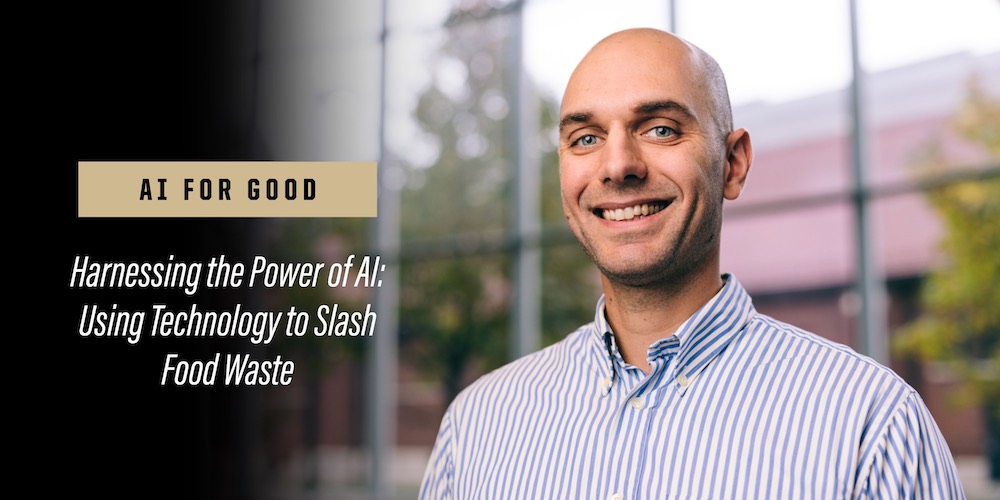Harnessing the power of AI: using technology to slash food waste
07-13-2023

Assistant Professor Alex Psomas
Purdue researcher to harness AI for good, determines how to eradicate food waste by automating "Food Drop" an initiative by the Indy Hunger Network
AI-powered strides are being made in the realm of food redistribution as researchers at Purdue University pave the way for automated solutions that promise to revolutionize the process of food donation.
Alex Psomas, assistant professor of computer science at Purdue University, is working with Indy Hunger Network to leverage AI to automate a food collection initiative that up to this point requires manual human decisions for every donation. The project is funded by Google’s AI for Social Good program for 2022-23.
Significant need
According to Feeding America, Indiana numbered more than 730,000 people experiencing food insecurity in the last year. To increase food donations, Indy Hunger Network created an initiative called Food Drop making it easier for truck drivers and dispatchers to donate supermarket-rejected loads of food.
When a load of unsalable, edible food is rejected due to logistical errors like imperfections, or other issues, truck drivers often have no option but to dump the load. With Food Drop, rejected loads can be accepted 24/7 and drivers receive tax deductible receipts for their donations.
Currently, the manual matching decisions made by the Food Assistance Programs Manager at Indy Hunger Network consume a considerable amount of time and effort when their resources could be spent in other tasks benefiting their mission to eradicate hunger.
Food Drop has been successful in matching an average of 10,447 lbs of food per month, with peak months reaching a staggering 62,000 lbs. However, the current manual approach to matching truckloads with food banks leads to inefficiencies and unequal distribution among potential recipients.
Developing automation for allocation
The goal of this Purdue and Indy Hunger Network initiative is to develop a comprehensive automation system that not only streamlines the process but also ensures fairness in food allocation, while freeing up valuable human resources for other critical tasks.
“By leveraging technology to create a more equitable system, this project has the potential to make a substantial impact on reducing food waste and alleviating hunger,” said Psomas.
Psomas’ project aims to address these challenges by completely automating the process, achieving two immediate objectives.
First, by leveraging advanced algorithms and data analysis techniques, the system will enhance the efficiency and fairness of the matching process, ensuring that a wider range of food banks receive donations.
Second, the automation will significantly reduce the time burden on the Food Assistance Programs Manager, enabling them to focus on other crucial aspects of food security initiatives.
To achieve AI-assisted automation for this project, we will need efficient run times,” said Psomas. He added, “The algorithms will need to combine preferences into a fair and economically efficient decision.”
A major challenge in the project is the dynamic environment with the allocation decisions need to be both fair and efficient despite uncertainties about the future. The team will focus on designing algorithms that can handle these complexities while ensuring optimal outcomes.
Machine learning can help with better predictions about future demand and supply of donations, however, fundamental aspects of the question, like the definition of fairness, are often context-specific. Psomas and Indy Hunger Network plan to work together on building a model which accurately reflects the real-world needs of the program.
AI for good
“While learning the needs of Food Drop, we will design algorithms with provable guarantees in this model,” said Psomas.
Psomas and his research team will be designing algorithms to best serve the needs of Indy Hunger Network to predict preferences of the truck drivers donating food.
We are expecting the number of donations and successful food matches to increase with this automation,” said Psomas. He added, “It’s an exciting undertaking for the Indy Hunger Network as it has the potential to increase the amount of people they are able to serve.”
Alex Psomas is a theoretical computer scientist and assistant professor in the Department of Computer Science at Purdue University. His research focuses on the intersection of computer science and economics. Using the application of tools and insights from computer science, he studies problems in a variety of economic environments. His research interest lies in algorithmic economics, artificial intelligence, computational social choice and mechanism design, machine learning, and algorithmic game theory. Psomas earned his PhD in computer science 2017 from the University of California, Berkeley with the Theory of Computation group, advised by Professor Christos Papadimitriou. Previously, he was a visiting researcher with Google Research and Research Fellow at the Simons Institute for the Theory of Computing and a postdoctoral researcher in the Computer Science Department at Carnegie Mellon University. Psomas earned an NSF CAREER Award in 2022.
About the Department of Computer Science at Purdue University
Founded in 1962, the Department of Computer Science was created to be an innovative base of knowledge in the emerging field of computing as the first degree-awarding program in the United States. The department continues to advance the computer science industry through research. US News & Reports ranks Purdue CS #20 and #16 overall in graduate and undergraduate programs respectively, seventh in cybersecurity, 10th in software engineering, 13th in programming languages, data analytics, and computer systems, and 19th in artificial intelligence. Graduates of the program are able to solve complex and challenging problems in many fields. Our consistent success in an ever-changing landscape is reflected in the record undergraduate enrollment, increased faculty hiring, innovative research projects, and the creation of new academic programs. The increasing centrality of computer science in academic disciplines and society, and new research activities - centered around data science, artificial intelligence, programming languages, theoretical computer science, machine learning, and cybersecurity - are the future focus of the department. cs.purdue.eduWriter: Emily Kinsell, emily@purdue.edu
Source: Alex Psomas, apsomas@purdue.edu